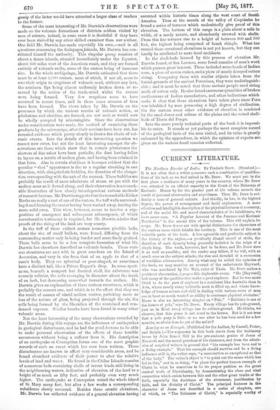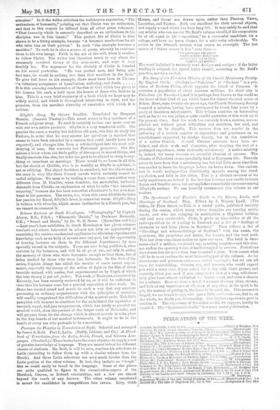Leaving us an Example. (Published for the Author, by Cassell,
Potter, and Galpin.)—The argument in this book starts from the testimony borne by John Stuart Mill to the pre-eminent genius of Jesus of Nazareth and the moral grandeur of his character, and from the admis- sion of sceptical writers in general that "his example has been and is a living example." That his example should survive and be a living influence still is, the writer says, "a resurrection as exceptional as that of the body." The writer's object is "to point out the cause which has led to this," and in so doing, "to place the perfect human example of Christ in what he conceives to be its proper position as the great central truth of Christianity, by demonstrating the close and vital connection which exists between this and the other great truths of the faith, especially the doctrines of the atonement, justification by faith, and the divinity of Christ." The principal features in the character of Jesus are described in a series of chapters, one of which, on "The Calmness of Christ," is especially 'worthy of
attention." In it the writer criticises the well-known expression," The enthusiasm of humanity," pointing out that Christ was no enthusiast, and that in this respect he differed from all other great reformers. "That humanity which is correctly described as an enthusiasm in his disciples, was in him innate." This perfect life of Christ is thus shown to be a living example, because "it becomes meritorious for all who take him as their pattern." In such "the example becomes a sacrifice." To such he is also a source of grace, whereby he conforms them to his own image. Faith is the act of the will, when it resolves to follow Christ. The writer has therefore much to say about the commonly received theory of the atonement, and says it very forcibly too. The argument for the divinity of Christ is founded on his moral perfection. "He was perfect man, and being per- fect man, he would be nothing loss than God manifest in the flesh." To give full force to his example, there must have been in his case "a voluntary acceptance of humiliation, suffering, and death It is this amazing condescension of the Son of God which has given to his human life such a hold upon the hearts of those who believe in him. This is a very brief summary of a book which we hope may be widely useful, and which is throughout interesting in style, and im- pressive, from the manifest sincerity of conviction with which it is written.



































 Previous page
Previous page